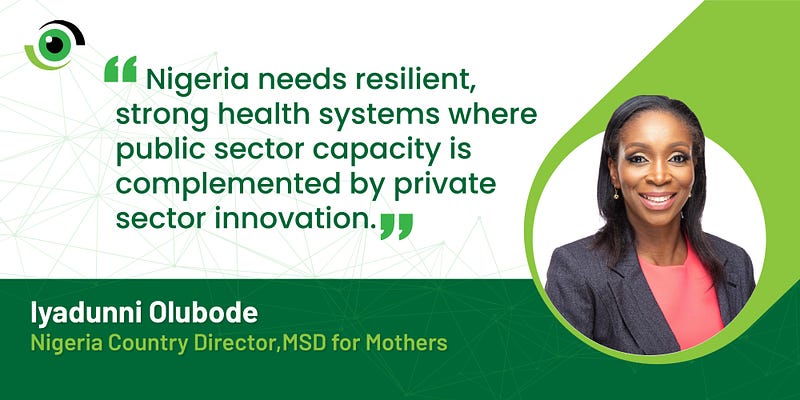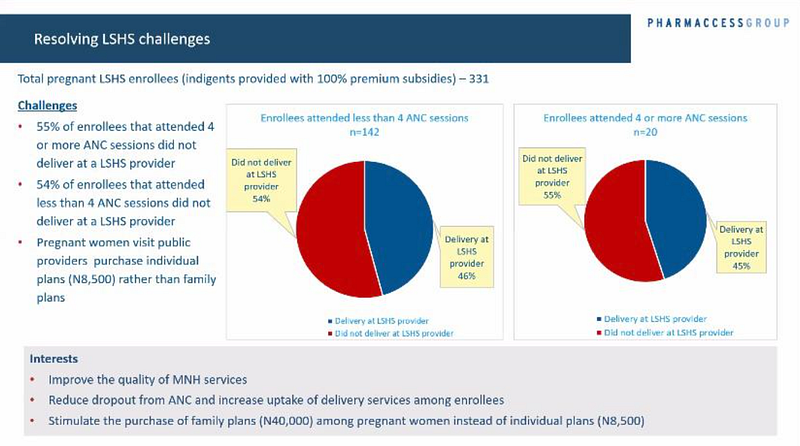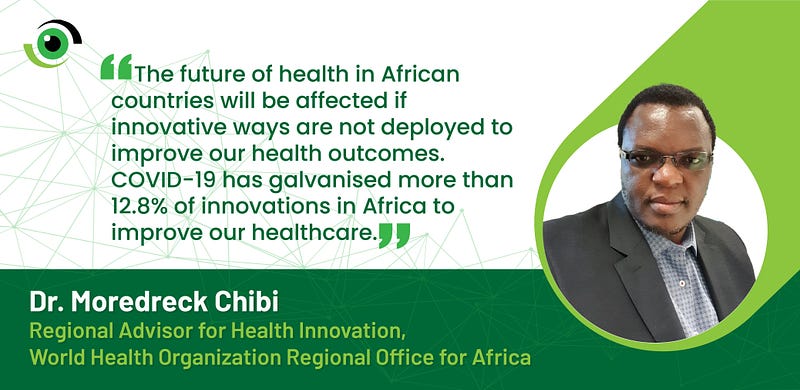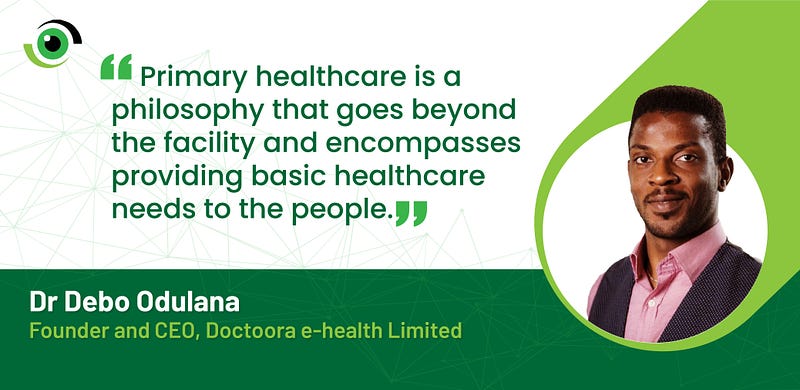Innovation is a term used to spur big business into evolving their way out of oblivion. In healthcare, refusal to innovate could mean loss of lives, especially for vulnerable populations who are most at risk of poor health outcomes and have significant challenges accessing quality healthcare.
When the 2020 Future of Health Conference theme, Innovation: Improving Health and Scaling Up Healthcare Access, was decided on in January 2020 during the Nigeria Health Watch annual strategy meeting, no one anticipated the global COVID-19 pandemic that would have an irrevocable impact on our way of life or the extent to which it would change global economies. Innovation in delivering healthcare to underserved communities is important if Nigeria is to drive towards Universal Health Coverage. COVID-19 has served to emphasise the urgent need to improve health and healthcare access with the need for new and improved health policies, systems, products and technologies, services and delivery methods that would serve to improve health outcomes. This is how the WHO Health Innovation Group (WHIG) has described innovations in healthcare.
‘COVID-19 has highlighted the need for us to think of how to use technologies and innovations to improve healthcare in Nigeria.’ This was the clarion call given to panellists and participants by Vivianne Ihekweazu, FHC 2020 anchor and Managing Director at Nigeria Health Watch.
This year’s virtual conference took advantage of technology to amplify innovative approaches to Nigeria’s healthcare. Nine speakers, representing nine disrupting organisations, explained the critical role they played in bridging the gap to healthcare access across the areas of maternal health, epidemics preparedness and primary healthcare.
Innovations in Maternal Healthcare
Iyadunni Olubode, Country Director for MSD for Mothers, moderated the first session on innovations in maternal healthcare. She set the tone for the session when she shared MSD for Mothers’ vision to help create a world where no woman has to die while giving birth anywhere in the world.

It was sobering to reflect on the fact that, with only ten years to go till 2030, Nigeria is still a far cry away from SDG Goal 3.1; to reduce maternal mortality rates to not more than 70 per 100,000 live births. The global pandemic only made maternal health indices worse. Olubode noted that to make any difference, Nigeria needs resilient, strong health systems where public sector capacity is complemented by private sector innovation.
Ms Onyedikachi Nwizu, Head of Operations, Mobicure shared how the digital health company has provided over 50,000 women in Nigeria with lifesaving and life-enhancing maternal-related information via their mobile app Omomi. Omomi, which means ‘my child’, takes advantage of Nigeria’s high mobile phone penetration to provide valuable antenatal, postnatal and child health information to parents who need it. It connects mothers to medical personnel in real-time.
The perception that innovation is usually capital intensive and thus costly is one that many of the speakers worked to dispel. Dr Ibironke Dada, Programme Director for SafeCare at PharmAccess Foundation, described the innovative ways SafeCare through MomCare is giving quality care to both mothers and babies. Through MomCare, “We believe we can leverage technology to improve maternal and new-born outcomes through different approaches that reduce high out of pocket payment for health and facility dropouts” she said.
At the #Innovate4HealthNaija conference, Dr. Dada shared some of the challenges facing pregnant enrollees of the Lagos State Health Insurance Scheme and how MomCare is helping to resolving some of the challenges faced.

Reducing indirect causes of maternal morbidity and mortality is critical to Nigeria achieving any form of progress towards SDG 3.1. Poor access to relevant information and self-care can be linked to indirect causes of maternal mortality. Dr Kendra Njoku, Quality Lead and Health of Programs at mDoc, spoke about mDoc’s work in optimising self-care during the pandemic to reduce accessible maternal information gaps. “To improve health literacy through digital health solution and innovation, and to improve health outcomes among our women, we had to keep educating them on how to use their digital devices properly,” she noted.
These innovations in maternal healthcare all helped to bridge the gap in access to healthcare, worsened by the COVID-19 pandemic. They also helped ease the anxiety women may have faced at the thought of being pregnant in such unprecedented times and being unsure how and whether they would be able to access healthcare.
Innovations in Epidemic Preparedness
COVID-19 has shown that there are different ways innovation has played a role in the response to infectious disease outbreaks.
Dr Lawal Bakare, CEO EpidAlert, and moderator for this session helped frame the discussion with insight into how the International Health Regulations provides a framework for signatory countries to protect, prevent and respond to disease outbreaks and events of public health importance to protect health and livelihoods. He said, ‘We need to strengthen the capacity of all countries for early warning, risk reduction and management of global health risks.’
Three organisations working in various aspects of epidemic preparedness shared insights at this year’s Future of Health Conference on how innovation has helped the world stay on top of COVID-19 as well as other infectious disease outbreaks.
One such organisation was Pandemic Tech, a global health security incubator which supports health security innovators on the frontline of fighting infections diseases and health security threats. Dr Andrew Nerlinger, Co-Founder, explained that Pandemic Tech brings together the technology and global health security communities in the fight against deadly infectious disease outbreaks. Innovation communities like those fostered by Pandemic Tech helped to provide the resources needed to take ideas and turning them into useable, sustainable and successful solutions in the fight for better global health security.
Dr Lois Olajide leads the Surveillance Outbreak Response Management and Analysis System (SORMAS) deployed by the Nigeria Centre for Disease Control (NCDC). SORMAS is Nigeria’s digital system for surveillance and outbreak data management. At FHC 2020, Dr. Olajide spoke about how SORMAS is being used for rapid collection, reporting & analysis of disease data in real-time for appropriate public health action. “It has helped to generate data which is key to fighting disease outbreaks not just in Nigeria but across the world,” Dr Olajide said. For her, the goal of SORMAS is to ensure that “We completely do away with paper-based records, to improve our response to emerging disease outbreaks and maintain an effective response to the current #COVID19 pandemic.”
For example, one important piece of data that would not have been possible without the SORMAS’ analysis system is the fact that only 20% of LGAs in Nigeria were actually responsible for 70% of all COVID-19 cases. This kind of data helps prioritise response, understand disease trends as well as map out risk factors such as high health worker infection rates, which Dr Olajide said led to targeted IPC training in affected communities.

Dr Moredreck Chibi agreed that needs-based innovation had to be at the forefront of countries’ health security response against COVID-19. Dr Chibi is the Regional Advisor for Health Innovation at the World Health Organisation Regional Office for Africa. This unit is responsible for supporting countries to create sustainable demand for innovations that meet contextual needs and local adoption of these innovations. He noted that empirical evidence has shown that the future of health in African countries will be affected if innovative ways are not deployed to improve our health outcomes. Reflecting on the role of innovation in Africa’s health security, he said, “The COVID-19 pandemic has galvanised more than 12.8% of the 1000 new or modifications of existing technologies that have been developed worldwide in Africa to improve our healthcare; this would have not been possible otherwise.”
Innovations in Primary Healthcare
“Primary healthcare is the basis by which we hope to achieve universal health coverage.” With this foundational statement, Editor-in-Chief at Nigeria Health Watch, Adaobi Ezeokoli, set the tone for conversations around innovations in primary healthcare. She dispelled what may have been a common notion that primary health care is the exclusive need of rural communities, noting that primary health care is capable of meeting more than 70 percent of people’s health needs. This echoes the vision set out by the Honourable Minister of Health during the media briefing setting out the president’s vision to achieve UHC. The Executive Secretary of the National Primary Healthcare Development Agency (NPHCDA), Dr. Faisal Shuaib highlighted the need to “leverage technology to strengthen data management, supply chain and remote access to health services”.
Dr Shubha Nagesh, Director Research and Follow-up Programmes at Latika Roy Foundation works with children and adults who have developmental and other disabilities to provide early intervention services, livelihoods development, education, training and awareness. She spoke on the long road to accessible healthcare for persons living with disabilities. This is important to Dr Nagesh because “People with disabilities have been left out of the world’s #COVID19 response. Disability helps to confirm and confront the structures that are not working, and it is the only minority group that one can join at any time and it is in our best interest to pay attention to the outcomes.”

Another organisation with an innovative business model providing inclusive and sustainable products and services across the globe is MobiHealth. Dr. Tazeen Rizvi, Mobihealth’s Global Chief Operating Officer shared how with the use of telemedicine, most of the non-communicable diseases in Nigeria such as malaria can be treated even without physically seeing a doctor. She explained that Mobihealth is changing the way PHC services can be accessed across Nigeria.
“How do we integrate healthcare to make sure that people are not totally left out of the safety net? We need to focus on what the community and the individuals need. This requires a lot of collaboration from everybody.” This was one of Dr Adebowale Odulana’s reflections at the conference. Dr Odulana is the Founder and CEO, Doctoora e-health Limited, which helps to close the gap between the supplier of healthcare and demand for healthcare. For him, primary healthcare is actually a philosophy that goes beyond the facility and encompasses providing basic healthcare needs to the people. Technology and innovation work with collaboration between innovating partners, he said.
All the insights shared by speakers highlighted the importance of innovation in improving healthcare access. Ultimately solutions must lead to the patient, must empower the patient with information and encourage partnership, coordination and collaboration. Conversations and communities which foster innovations in healthcare need to continue even as we keep in mind the end goal; innovation must bridge the gap between the health care provider and the client. These innovations need to be supported by an enabling environment that provides the adequate policy instruments that enable the growth of sustainable and scalable health solutions that ultimately deliver accessible and affordable health for all.
Did you miss the Future of Health Conference? Catch up on all the great conversations here


